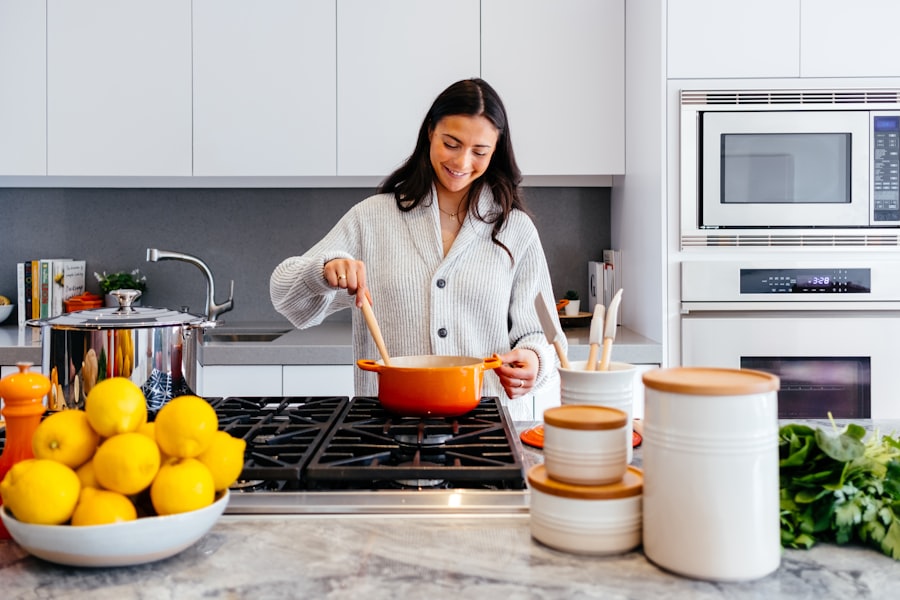In recent years, the culinary landscape has been transformed by the advent of artificial intelligence (AI), particularly in the realm of recipe recommendations. KI-gesteuerte Rezeptempfehlungen, or AI-driven recipe suggestions, have emerged as a revolutionary tool for home cooks and professional chefs alike. These systems leverage vast amounts of data to provide tailored culinary advice, making cooking more accessible and enjoyable.
As technology continues to evolve, the integration of AI into our kitchens promises to enhance not only the way we prepare meals but also how we think about nutrition and food choices. The rise of AI in the culinary world is not merely a trend; it represents a significant shift in how we interact with food. With the ability to analyze user preferences, dietary restrictions, and available ingredients, these intelligent systems can suggest recipes that cater to individual tastes and needs.
This personalization is particularly appealing in an age where consumers are increasingly health-conscious and eager to explore diverse cuisines. As we delve deeper into the mechanics of these systems, it becomes clear that they are reshaping our culinary experiences in profound ways.
Key Takeaways
- KI-gesteuerte Rezeptempfehlungen (AI-driven recipe recommendations) use artificial intelligence to suggest personalized recipes based on user preferences and available ingredients.
- KI-Systeme (AI systems) have the ability to analyze user preferences and ingredients to provide tailored recipe suggestions, making cooking more convenient and enjoyable.
- Automatic recipe suggestions based on available ingredients help users reduce food waste and make the most out of their pantry items.
- Personalized nutrition plans using KI-driven recipe recommendations can help users achieve their health and wellness goals more effectively.
- The impact of KI-driven recipe recommendations on user experience is significant, as it saves time and effort in meal planning and encourages culinary creativity.
Understanding KI-Systeme and their ability to analyze user preferences and ingredients
The Power of AI-Driven Recipe Recommendations
At the heart of AI-driven recipe recommendations lie sophisticated AI systems designed to process and analyze vast datasets. These systems utilize machine learning algorithms that can learn from user interactions, preferences, and feedback over time. By examining patterns in cooking habits, ingredient usage, and even flavor profiles, these AI systems can create a comprehensive understanding of what users enjoy and what they might be willing to try next.
Personalization and Efficiency
This capability allows for a level of personalization that was previously unattainable in traditional recipe recommendation methods. Moreover, these AI systems are adept at analyzing the ingredients users have on hand. By inputting available items into the system, users can receive suggestions that maximize their existing pantry supplies while minimizing food waste.
Promoting Sustainability and Creativity
This not only encourages creativity in the kitchen but also promotes sustainability—a crucial consideration in today’s environmentally conscious society. The ability to seamlessly integrate user preferences with available ingredients makes these AI-driven solutions invaluable for anyone looking to streamline their cooking process.
Automatic recipe suggestions based on available ingredients

One of the most exciting features of KI-gesteuerte Rezeptempfehlungen is their ability to generate automatic recipe suggestions based on the ingredients users have at their disposal. Imagine standing in your kitchen, staring at a collection of vegetables, grains, and proteins, unsure of what to make for dinner. With an AI-driven recipe recommendation system, you can simply input your available ingredients into an app or platform, and within moments, receive a curated list of recipes tailored to what you have on hand.
This functionality not only saves time but also encourages users to experiment with new combinations and flavors they might not have considered otherwise. For instance, if you have leftover quinoa, some spinach, and a few spices, the AI might suggest a delicious quinoa salad or a savory spinach stir-fry. By providing these suggestions, AI systems help users break free from the monotony of repetitive meals and inspire them to explore new culinary horizons.
Personalized nutrition plans using KI-driven recipe recommendations
Beyond mere recipe suggestions, KI-gesteuerte Rezeptempfehlungen can also play a pivotal role in developing personalized nutrition plans. As health awareness grows among consumers, many individuals are seeking ways to tailor their diets to meet specific health goals—be it weight loss, muscle gain, or managing chronic conditions.
For example, an individual looking to increase their protein intake might receive recommendations for high-protein recipes that incorporate their favorite ingredients. Alternatively, someone with dietary restrictions—such as gluten intolerance or vegan preferences—can benefit from customized meal plans that ensure they receive balanced nutrition without compromising their dietary needs. This level of personalization not only enhances user satisfaction but also empowers individuals to take control of their health through informed food choices.
The impact of KI-driven recipe recommendations on user experience
The integration of AI into recipe recommendations has significantly enhanced the overall user experience in the kitchen. By providing tailored suggestions that consider personal tastes and available ingredients, these systems reduce the stress often associated with meal planning and preparation. Users no longer need to spend hours searching for recipes or worrying about whether they have the right ingredients; instead, they can rely on AI to streamline the process.
Furthermore, the interactive nature of these systems fosters a sense of engagement and exploration. Users can provide feedback on suggested recipes, allowing the AI to refine its recommendations over time. This dynamic relationship between users and technology creates a more enjoyable cooking experience, as individuals feel empowered to experiment with new dishes while still receiving guidance from an intelligent source.
The result is a more confident home cook who is eager to explore the culinary arts.
Potential challenges and limitations of KI-driven recipe recommendations

Despite the numerous advantages offered by KI-gesteuerte Rezeptempfehlungen, there are also challenges and limitations that must be acknowledged. One significant concern is the reliance on data quality and availability. For AI systems to provide accurate recommendations, they require access to extensive databases of recipes and ingredient information.
If this data is incomplete or biased, it could lead to suboptimal suggestions that do not align with users’ preferences or dietary needs. Additionally, there is the issue of user trust in AI-generated recommendations. While many individuals embrace technology in their daily lives, some may remain skeptical about relying on an algorithm for something as personal as food choices.
Building trust requires transparency in how these systems operate and how they arrive at their recommendations. Users need assurance that their preferences are being respected and that the suggestions provided are genuinely beneficial for their health and well-being.
Future developments and advancements in KI-driven recipe recommendations
Looking ahead, the future of KI-gesteuerte Rezeptempfehlungen is brimming with potential advancements that could further enhance user experiences in the kitchen. One promising direction is the integration of voice-activated technology into these systems.
This hands-free interaction would make cooking even more convenient and accessible. Moreover, advancements in natural language processing could enable these AI systems to understand user queries more intuitively. Instead of simply inputting ingredients or preferences, users could describe what they’re craving or any specific dietary concerns they have in conversational language.
This would allow for a more fluid interaction between users and AI systems, making recipe recommendations feel even more personalized and relevant.
the potential of KI-driven recipe recommendations for personalized cooking and nutrition
In conclusion, KI-gesteuerte Rezeptempfehlungen represent a remarkable intersection of technology and culinary arts that has the potential to revolutionize how we approach cooking and nutrition. By harnessing the power of AI to analyze user preferences and available ingredients, these systems offer personalized recipe suggestions that cater to individual tastes while promoting healthier eating habits. As we continue to embrace technological advancements in our kitchens, it is clear that AI-driven solutions will play an increasingly vital role in shaping our culinary experiences.
The journey toward personalized cooking through AI is just beginning, with exciting developments on the horizon that promise to enhance user engagement and satisfaction further. As we navigate this evolving landscape, it is essential to remain mindful of the challenges that accompany such innovations while celebrating the opportunities they present for healthier living and culinary exploration. Ultimately, KI-gesteuerte Rezeptempfehlungen hold immense potential for transforming our relationship with food—making cooking not just a necessity but a delightful adventure filled with creativity and discovery.
KI-gesteuerte Rezeptempfehlungen revolutionieren die Art und Weise, wie wir kochen, indem sie Benutzerpräferenzen und Inhaltsstoffe analysieren, um maßgeschneiderte Vorschläge zu liefern. Diese Systeme können nicht nur automatische Rezeptvorschläge basierend auf vorhandenen Zutaten generieren, sondern auch personalisierte Ernährungspläne erstellen, die auf individuellen Bedürfnissen basieren. Ein verwandter Artikel, der sich mit den Herausforderungen und Chancen in der digitalen Welt befasst, ist „Challenges and Opportunities: Regulatory Landscape“, der interessante Einblicke in die regulatorischen Aspekte von KI-Technologien bietet.
FAQs
What are KI-gesteuerte Rezeptempfehlungen?
KI-gesteuerte Rezeptempfehlungen refer to recipe recommendations generated by artificial intelligence (KI) systems. These systems analyze user preferences and ingredients to provide personalized recipe suggestions.
How do KI systems analyze user preferences and ingredients?
KI systems use algorithms to analyze user data such as past recipe choices, dietary restrictions, and flavor preferences. They also analyze the nutritional content and flavor profiles of ingredients to match them with user preferences.
What are the potential applications of KI-gesteuerte Rezeptempfehlungen?
Potential applications of KI-gesteuerte Rezeptempfehlungen include automatic recipe suggestions based on available ingredients, personalized meal plans based on nutritional needs, and tailored recipe recommendations for specific dietary requirements.
How can KI-gesteuerte Rezeptempfehlungen benefit users?
KI-gesteuerte Rezeptempfehlungen can benefit users by saving time and effort in meal planning, providing personalized and diverse recipe options, and helping users make healthier and more satisfying food choices.
Privacy concerns may arise from the collection and analysis of user data by KI systems. Users should be aware of how their data is being used and stored, and companies should prioritize data security and transparency in their KI-driven recipe recommendation systems.











Leave a Reply